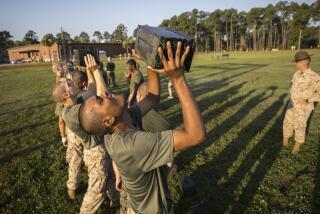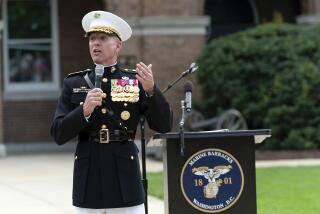Marines Hope Success on Land Gives Their Future a Foothold
- Share via
KANDAHAR, Afghanistan — After a night visiting young troops standing guard in the freezing winter air of Central Asia, Marine Commandant Gen. James Jones was asked what impact the Afghanistan campaign will have on the Corps.
He didn’t hesitate. The Marines’ success here, he said, may finally silence critics who say that the Corps is a fine amphibious assault force but that its combat effectiveness declines drastically when it gets more than a few hundred miles from the beach.
“We spend so much time in Washington banging our head against the wall with different audiences, saying, ‘We can do this, we can do this,’ ” Jones said.
As commandant, Jones has pursued a strategy of “expeditionary maneuver warfare” designed to prepare the Marines to strike faster and farther inland. Among other changes, Jones has procured fast-attack vehicles made by Mercedes-Benz, now being used in Afghanistan.
Even before Jones’ surprise Thursday night visit--in which he walked the perimeter of the bombed-out Kandahar airport, where 1,000-plus Marines are camped, to speak with troops on guard--it had become a mantra among officers and senior enlisted personnel alike that the Afghan campaign will help assure the Marines’ survival.
As the smallest of the four armed services, the Marine Corps is in a constant state of worry about its future--and whether it will be folded into the much larger Army. The rivalry between the Marine Corps and Army is intense.
A story making the rounds holds that a commander was lauding last month’s seizure of the former Taliban facility the Marines turned into Camp Rhino, the Corps’ first desert outpost in Afghanistan. The troops’ helicopter-borne operation so far from their ships in the northern Arabian Sea came as a surprise to two groups, the commander said.
“The Marines surprised the Taliban. And the Marines surprised the U.S. Army,” he said, to lusty cheers and shouts of “Hoo-raw!”
The Marines, as a fast-moving, lightly armored force, are generally considered best when working within 200 miles of supply ships at sea. The outpost at Camp Rhino is more than 400 miles from sea, and Kandahar is an additional 75 miles. If the Marines push farther, possibility to Tora Bora to aid the cave-by-cave hunt for Osama bin Laden and other Al Qaeda leaders, it will further contradict the notion that the Corps is limited in its reach, Marine officers said.
“They’ve demonstrated they can operate much farther inland than Marines have traditionally operated, and do it very quickly,” Charles Pena, senior defense policy analyst at the Cato Institute, a libertarian think tank in Washington, concurred in a telephone interview.
Seizing an outpost is one thing, but keeping it resupplied with the food, water and spare parts that keep a fighting force at top efficiency is another. With the help of Navy Seabees, a dusty runway at Camp Rhino saw a nightly parade of cargo planes bringing in the stuff of war. “Fighting is the easy part of any war,” said one senior Marine officer, exaggerating for effect. “Moving thousands of men hundreds of miles, that’s the hard part, the part that can cripple you.”
Just keeping the vehicles running is an ordeal. At Camp Rhino, wind-driven dust covers everything every day, clogging fuel lines and fouling engines. Mistakes in the use of fuel incapacitated several Humvees, and replacement parts had to be brought in from Camp Pendleton.
Still, records show that there was a smaller percentage of lost days due to repair work than during a routine exercise at Twentynine Palms, the Marine Corps’ training facility in the high desert of Southern California.
“When all is said and done, this validates the way the Marines fight: We bring everything prepackaged,” said Lt. James D. Jarvis, spokesman for the Camp Lejeune, N.C.-based 26th Marine Expeditionary Unit.
It is true, of course, that the Marines had advantages that may not be present in the next stage of the war on terrorism, wherever and whenever it occurs. Nations in the region offered assistance in resupplying troops and refueling aircraft, and the troops here have met little local resistance.
The Marines plan to lean heavily on successes in Afghanistan in fighting the annual budget battles in Washington and the skirmishes expected from the Bush administration’s bid to streamline the military.
“The Marine Corps feels it is very well positioned to be a major player in the war on terrorism,” Jones said after his night among the troops.
More to Read
Sign up for Essential California
The most important California stories and recommendations in your inbox every morning.
You may occasionally receive promotional content from the Los Angeles Times.













